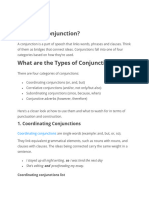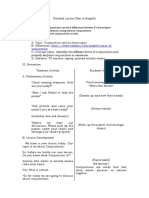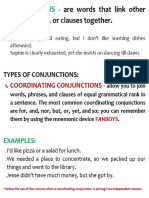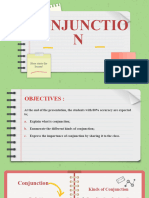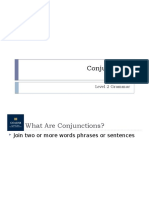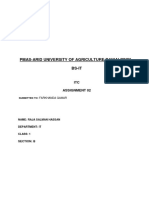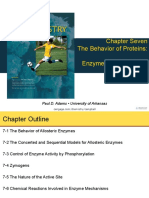Conjunctions
Conjunctions are words that link words, phrases, clauses, or sentences. They help
provide cohesion and logical flow in writing and speaking. Conjunctions can be
divided into three main categories:
1. Coordinating Conjunctions -
These connect words, phrases, or independent clauses that are of equal
importance or structure.
Mnemonic: FANBOYS (For, And, Nor, But, Or, Yet, So)
Examples:
o For: Explains a reason.
I stayed home, for it was raining.
o And: Adds information.
She loves painting and drawing.
o Nor: Presents an additional negative idea.
He doesn't like co ee, nor does he like tea.
o But: Indicates contrast.
I wanted to go out, but I was too tired.
o Or: O ers a choice or alternative.
Would you like tea or co ee?
o Yet: Introduces a surprising contrast.
She is young, yet she is very wise.
o So: Shows result or e ect.
He studied hard, so he passed the exam.
2. Subordinating Conjunctions -
These introduce dependent (subordinate) clauses and show the relationship
between the dependent clause and the independent clause.
Common Subordinating Conjunctions:
o Time: after, before, since, when, while, until, as soon as
I will call you after I finish dinner.
o Cause/Reason: because, since, as
She left early because she was feeling unwell.
o Condition: if, unless, provided that, in case
If it rains, we’ll stay indoors.
� o Contrast/Concession: although, though, even though,
whereas, while
Although it was late, she continued working.
o Purpose: so that, in order that
He spoke clearly so that everyone could understand.
o Result: that
She was so tired that she fell asleep instantly.
3. Correlative Conjunctions -
These work in pairs to link balanced or related ideas.
Examples:
o Either...or: You can either stay home or come with us.
o Neither...nor: She is neither tall nor short.
o Both...and: Both the manager and the employees attended
the meeting.
o Not only...but also: He is not only intelligent but also
hardworking.
o Whether...or: I’m not sure whether we should stay or leave.
Usage Tips:
1. Avoid Overuse: Using too many conjunctions can lead to long,
confusing sentences. Use them sparingly for clarity.
2. Punctuation:
o For coordinating conjunctions, use a comma when joining
two independent clauses.
I wanted to play, but it was raining.
o For subordinating conjunctions, a comma is needed if the
dependent clause comes first.
Although it was late, she stayed awake.
She stayed awake although it was late.


















